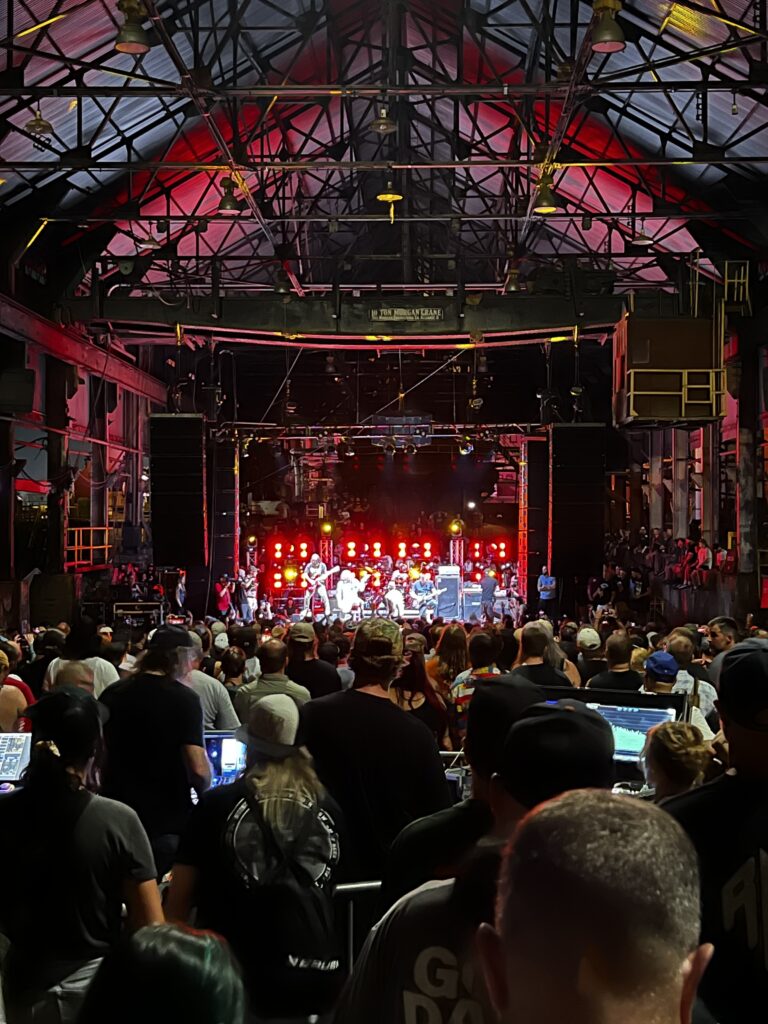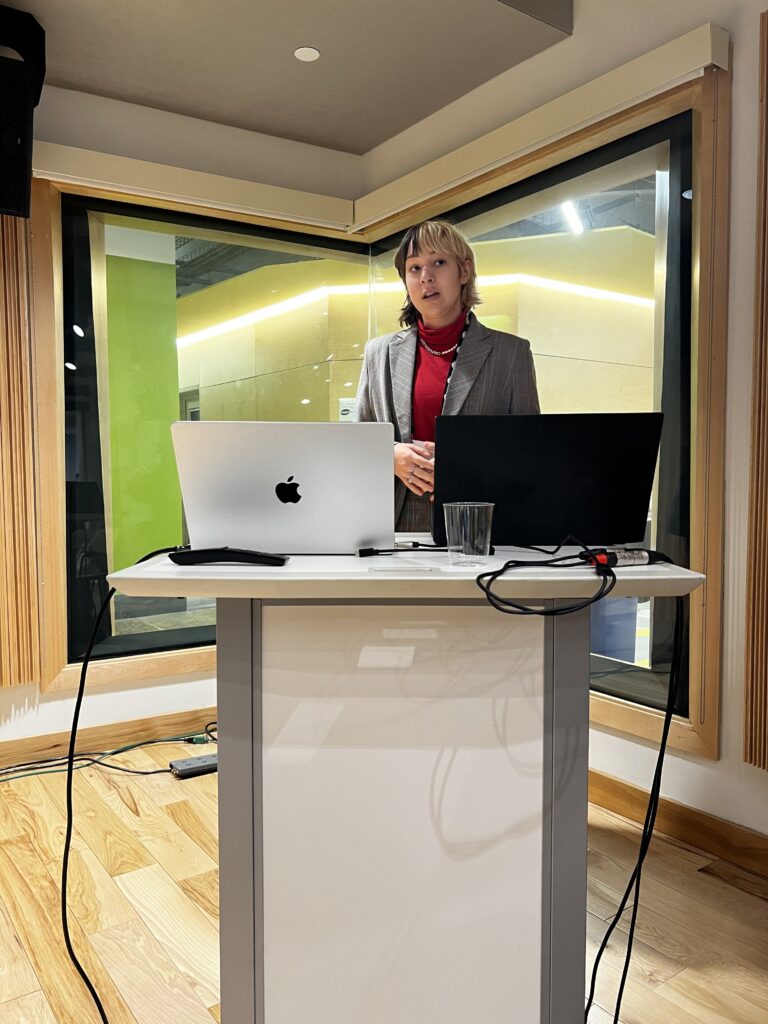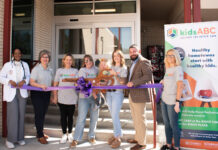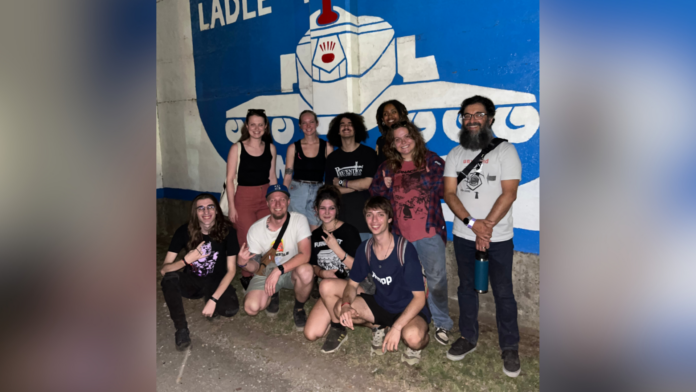
A collaborative project between Mercer and Northeastern universities revealed a surprising commonality among the attendees of a revived music festival: life trauma. Now, the research team plans to use its data to help connect mental health agencies with musical communities in need of services.
Dr. Nathan Myrick, assistant professor of church music at Mercer, and Dr. Andrew Mall, associate professor of music at Northeastern, are ethnomusicologists who study the cultural and social contexts of music. They teamed up in 2019 when they learned that Furnace Fest was returning for a 20-year reunion.
Furnace Fest — a three-day event featuring a lineup of both Christian and secular musicians in the hardcore metal/rock/punk genre — was held annually from 2000 to 2003 in Birmingham, Alabama. While the festival was not billed as a religious event, it was associated with the Christian community.
With Myrick’s research focus being religious communities and Dr. Mall’s being festivals in quasi-religious communities, the project was a perfect pairing of their research interests and a unique opportunity to study the effects of nostalgia and affinity group marketing and get a sociological snapshot of a community, Dr. Myrick said.
The 2000s and 2010s saw a large-scale exit from the Christian faith and evangelical Christianity by Gen Xers and millennials, including many Furnace Fest participants, Dr. Myrick said. Nonetheless, word of the festival’s rebirth was met with enthusiastic response by previous attendees, who formed an active online, close-knit community. Dr. Myrick was curious what these former attendees were doing now and why they were still interested in this festival.
“Demographically, 80% had grown up in some sort of Christian community, and 75% were no longer attending church or no longer identifying themselves as Christian or religious, and yet, they wanted to go back to this festival that had historically been populated by Christian music bands,” he said.
Delayed a year by COVID-19, Furnace Fest returned in 2021 and far exceeded expectations with 10,000 attendees. Dr. Myrick and Dr. Mall interviewed concertgoers during the event, and one of their questions was why people had gotten involved in the Furnace Fest community initially.
“The universal answer was to respond with some sort of narrative of trauma — some terrible thing that had happened to them or some sort of crisis of identity or faith,” Dr. Myrick said. “It’s really unusual to get an entire community open to you like that. It took us a couple of days to realize that this was what was holding this community together, this shared expectation of traumatic experiences.”
Wanting to learn more, the professors returned to the festival the next three years with student research assistants from both Mercer and Northeastern. Altogether, eight students contributed to the project. A clinical psychologist from Northeastern also joined the team for the 2024 festival.
Dr. Myrick and Dr. Mall adapted ethnography methods typically used in political and social sciences to align with their project goals as ethnomusicologists. Their collaborative research model involving faculty and students from two institutions is unique for the field and has gained notice, Dr. Myrick said.
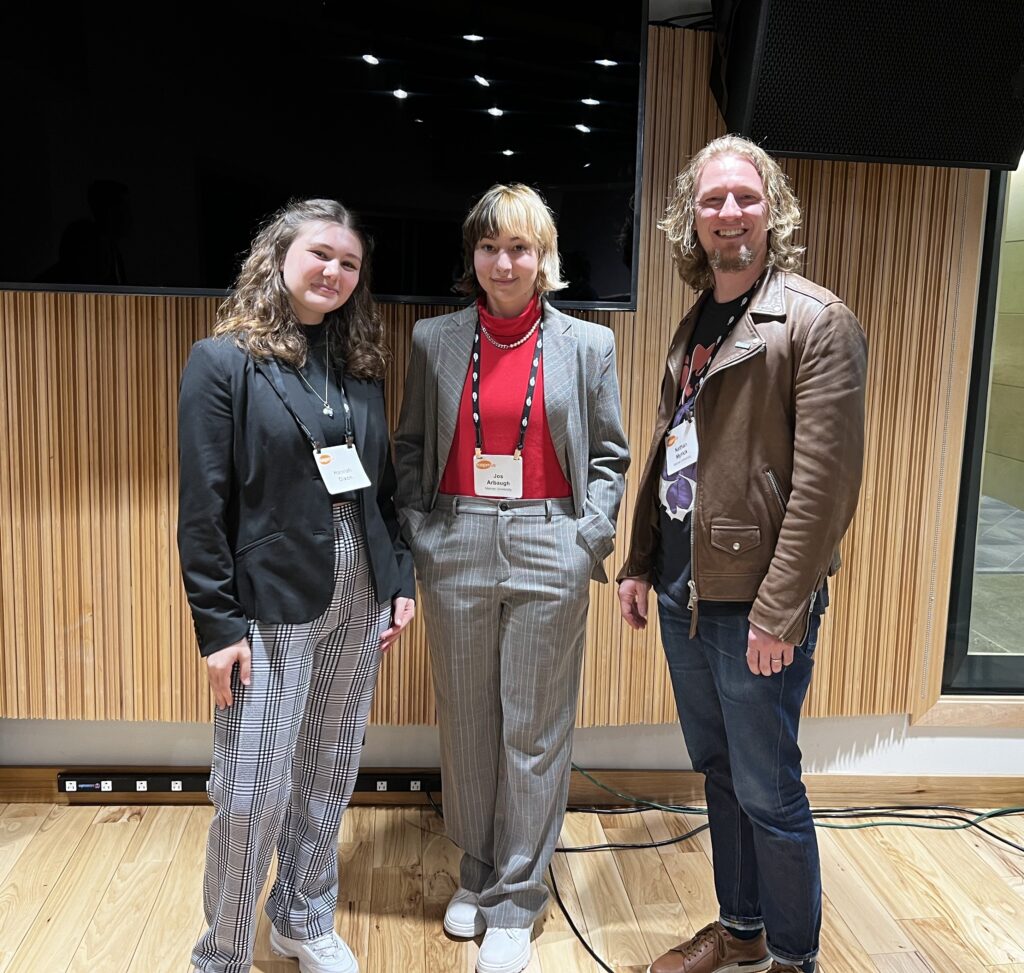
Dr. Myrick, 2024 Mercer graduate Jos Arbaugh and Mercer sophomore Hannah Dixon presented their research during a panel at the annual meeting of the International Association for the Study of Popular Music in April 2024, and the research team has been invited to write an article on their methodology for the journal Ethnomusicology.
Before and after the festivals, surveys were emailed to attendees. While the events were happening, the team interviewed concertgoers in between sets or while they were waiting in line. For the 2024 event, they also conducted a mental health needs assessment inside a Mercer-branded tent. Their work has been supported by grants from Mercer, Northeastern, and the the Music and Entertainment Industry Educators Association.
Dixon, a music and media studies double-major and a lover of punk rock, learned about the research opportunity when she met Dr. Myrick at Heritage Scholars Weekend prior to becoming a Mercer student. During the 2023 festival, which was her first live concert experience, she interviewed attendees and focused on the theme of kindness and support. For the 2024 event, she talked with people inside the Mercer tent. She is currently working on a video essay about her experiences and the mental health aspect of the research.
“It got really deep and heavy,” Dixon said of the interviews. “It was an incredible learning experience.”
Attending the festival allowed Dixon to get to know and better understand the Furnace Fest community. Dixon said she felt included and welcomed there, and she saw how moshing, crowd-surfing and stage-diving are methods of connection for this community.
“Folk punk has my heart,” said Arbaugh, who contributed to the project and graduated in May with a psychology degree. “I’ve been in the punk scene since I started college. I got into the hardcore punk scene, and going to Furnace Fest really broadened what I was listening to in that genre.”
Arbaugh had only been to a couple concerts prior to getting involved in the research project and has now seen over 100 bands live at Furnace Fest and other shows. Furnace Fest introduced them to a community of friends who love the music genre and gave them the courage to attend concerts locally and in other states.
Prior to the 2022 festival, the research team kept a log of the themes of posts on the Furnace Fest Facebook page and did preliminary research, Arbaugh said. Arbaugh interviewed concertgoers during the 2022 show and spent the 2023 event mostly observing for their research paper, which focused on gender presentation at the festival scene. They presented their research at BEAR Day and to students at Drexel University in the spring.
“I just loved getting to pursue my own interests as far as Furnace Fest goes,” Arbaugh said.
The key demographic for Furnace Fest is people from rural, Rust Belt, Midwest and Appalachian areas, and those are some of the areas with the least access to mental health care and financial support for those services, Dr. Myrick said.

“With the mental health needs assessment, we were trying to figure out how to connect people in these kinds of communities with the mental health professionals who can give them the care they need,” Dr. Myrick said. “The punk/hardcore/emo/metal communities around the United States are populated by people who are dealing with some kind of trauma. They’re people who are trying to deal with something that has been deemed harmful to their emotional state.”
The 2024 festival was supposed to be the final event, but it was announced in November that it would return in fall 2025. Furnace Fest turned into a place of safety and empathy for attendees, and the researchers hope their data can be used to help address this community’s mental health needs. They have been working with some mental health agencies, are analyzing their data, and will seek grant funding to help make connections to provide mental health care where it’s needed.
“It’s about making mental health care more accessible and making people more aware that mental health is something that should be talked about,” Dixon said. “I hope if people can get more access to (mental health care) that they will see just how important getting help and seeking out people is. People need people.”
This research could open the door to similar initiatives for other music communities. Some initial ideas are to provide more awareness of and access to mobile counseling trucks and telehealth sessions, Dr. Myrick said.
This festival has provided a support outlet for many people, but people shouldn’t have to seek out a special scene to find that, Arbaugh said. Arbaugh thinks this research project could help take mental health support and resources outside of this “little bubble of a niche music genre.”
“I would love to see the stigma of mental health being dropped,” Arbaugh said. “If people didn’t have to be ‘othered’ and pushed out of their original space to get help, I think that’s an ideal world.”
On a larger level, this research also shows the role that churches can play in being a place of health, healing and support for their congregants. For many Furnace Fest attendees, it was the opposite, and they considered the church as a source of their trauma. If framed correctly, church and musical worship can become a space for people to express, recognize and cope with their trauma, Dr. Myrick said.
“How does the church respond to these kinds of people, and what does this research have to offer churches around the country for how to better minister to the needs of people who are dealing with mental health issues? We’re all dealing with some kind of trauma. If you’ve lived long enough, you’ve seen some things. Churches and communities tend to function best when that is foregrounded,” he said.
In addition, the research project shows how important emotional or affective processing is for people who have experienced trauma.
“Music is also a really important aspect of effective narrative, of putting your feelings into some kind of meaningful organized story,” he said. “I think that if churches can recognize and embrace that, we will hopefully have a much better and a more healthy and healing music ministry in our congregations.”
